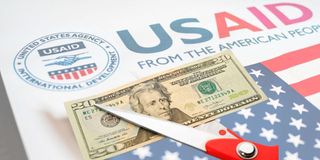12 lucky firms get Sh44 billion despite USAID cash freeze

The management of key diseases in Kenya will be disrupted after the US cut funding for an important health programme, which supports data collection.
The US Embassy in Nairobi has over the past week wired Sh44 billion ($ 344 million) to 12 facilities conducting health and development work in Kenya.
The funding comes amid the ongoing shutdown of the US Agency for International Development (Usaid), providing critical support to organisations whose operations were previously threatened.
According to an official memo to the US Congress as of March 21, 2025,' Ryan Shrum, the Senior Advisor for Legislative and Congressional Affairs, disclosed the transfers to various organisations around the world, including the 12 in Kenya.
They include LVCT Health, Technoserve, Deloitte and more.
Dr Lorraine Mugambi, an endocrinologist at CHS-Kenya, confirmed that they have resumed operations following reinstatement of their funding.
"We immediately resumed operations with our priority now being handling collection of TB samples and testing throughout the country, with guidance from the Health Ministry," she told Nation.
The funding represents significant relief for Kenya's health programmes, particularly HIV response. Of the Sh 80.5 billion required for Kenya's national health programmes, approximately Sh24.9 billion is provided by the US government.
The current situation stems from efforts by the Trump administration to shut down Usaid. In February, a US Federal Judge blocked the administration from taking further steps to close the agency, with Judge Theodore Chuang explaining that these efforts, led by Trump ally Elon Musk's Department for Government Efficiency (Doge), likely violated the US constitution "in multiple ways."
In early March, another federal judge ordered the administration to pay Usaid partners for billions of dollars in work completed before February 13, warning that the President does not have "unbounded power in the realm of foreign affairs".
However, last Friday, a three-judge bench of the US federal appeals court cleared the way for cutting aid after Judge Marvin Quattlebaum ruled that Musk's actions were not unconstitutional as they were approved by officials with direct authority over the agency.
Kenya's Health Ministry has documented the serious consequences of the funding freeze in its policy document 'Impact of the United States Government Stop Work Order.' The document highlights that vital initiatives—especially those supported by Pepfar, Usaid, and CDC—have experienced severe service interruptions, undermining decades of progress in HIV treatment and broader public health.
"This vital support flows through a network of specialised service providers that ensure lifesaving interventions reach vulnerable populations. For example, the Mission for Essential Drugs manages commodities for HIV, TB, and malaria, while Imperial Managed Solutions (IMS) oversees family planning supplies. In parallel, Unicef and the World Food Programme (WFP) are responsible for the distribution of nutrition-related commodities," the policy document notes.
Shrum informed US Congress that Usaid currently maintains 898 active programmes globally with a total estimated cost of $78 billion (Sh9.98 trillion) and unobligated remaining value of $8.3 billion (Sh1.06 trillion). These focus primarily on strategic and life-saving aid, including emergency food assistance and global health activities.
As the situation continues to evolve, Kenyan health organisations are left navigating between temporary relief from the recent fund transfers and the uncertainty of long-term support amidst the ongoing Usaid restructuring and legal challenges in the United States.





